In-depth Report: Entrepreneurship and Small Business Management Study
VerifiedAdded on 2022/12/26
|17
|4559
|1
Report
AI Summary
This report provides a comprehensive overview of entrepreneurship and small business management, exploring different types of entrepreneurial ventures, including small business entrepreneurship, large company entrepreneurship, scalable start-up entrepreneurship, and social entrepreneurship. It highlights the differences and similarities between public, private, and social entrepreneurial ventures, examining their structures, performance evaluation, ownership, and revenue usage. The report further discusses the significant impact of small businesses on the economy, such as new business creation, contribution to national income, development of new markets, increased competition, and enhanced productivity. It also emphasizes the importance of small businesses on the social economy, including providing quick services, employment opportunities, improving quality of life, fostering community development, and enhancing education. Additionally, the report differentiates between the skills required for successful entrepreneurs and managers and explores how an entrepreneurial personality reflects motivation and mindset, while also considering how personal background and experiences can either hinder or foster entrepreneurship.

Entrepreneurship and Small
Business Management
Business Management
Paraphrase This Document
Need a fresh take? Get an instant paraphrase of this document with our AI Paraphraser

TABLE OF CONTENT
INTRODUCTION ..........................................................................................................................3
MAIN BODY...................................................................................................................................3
Types of Entrepreneurship Venture............................................................................................3
Differences and Similarities between Entrepreneurial Ventures.................................................5
Impact of Small business on economy.........................................................................................6
Importance of Small business on Social economy......................................................................7
Skills required for becoming successful entrepreneur and its differences with a manager.........9
Entrepreneurial personality reflect entrepreneurial motivation and mind-set...........................10
Background and experience can hinder or foster entrepreneurship...........................................11
CONCLUSION..............................................................................................................................12
REFERENCES..............................................................................................................................14
INTRODUCTION ..........................................................................................................................3
MAIN BODY...................................................................................................................................3
Types of Entrepreneurship Venture............................................................................................3
Differences and Similarities between Entrepreneurial Ventures.................................................5
Impact of Small business on economy.........................................................................................6
Importance of Small business on Social economy......................................................................7
Skills required for becoming successful entrepreneur and its differences with a manager.........9
Entrepreneurial personality reflect entrepreneurial motivation and mind-set...........................10
Background and experience can hinder or foster entrepreneurship...........................................11
CONCLUSION..............................................................................................................................12
REFERENCES..............................................................................................................................14

⊘ This is a preview!⊘
Do you want full access?
Subscribe today to unlock all pages.

Trusted by 1+ million students worldwide
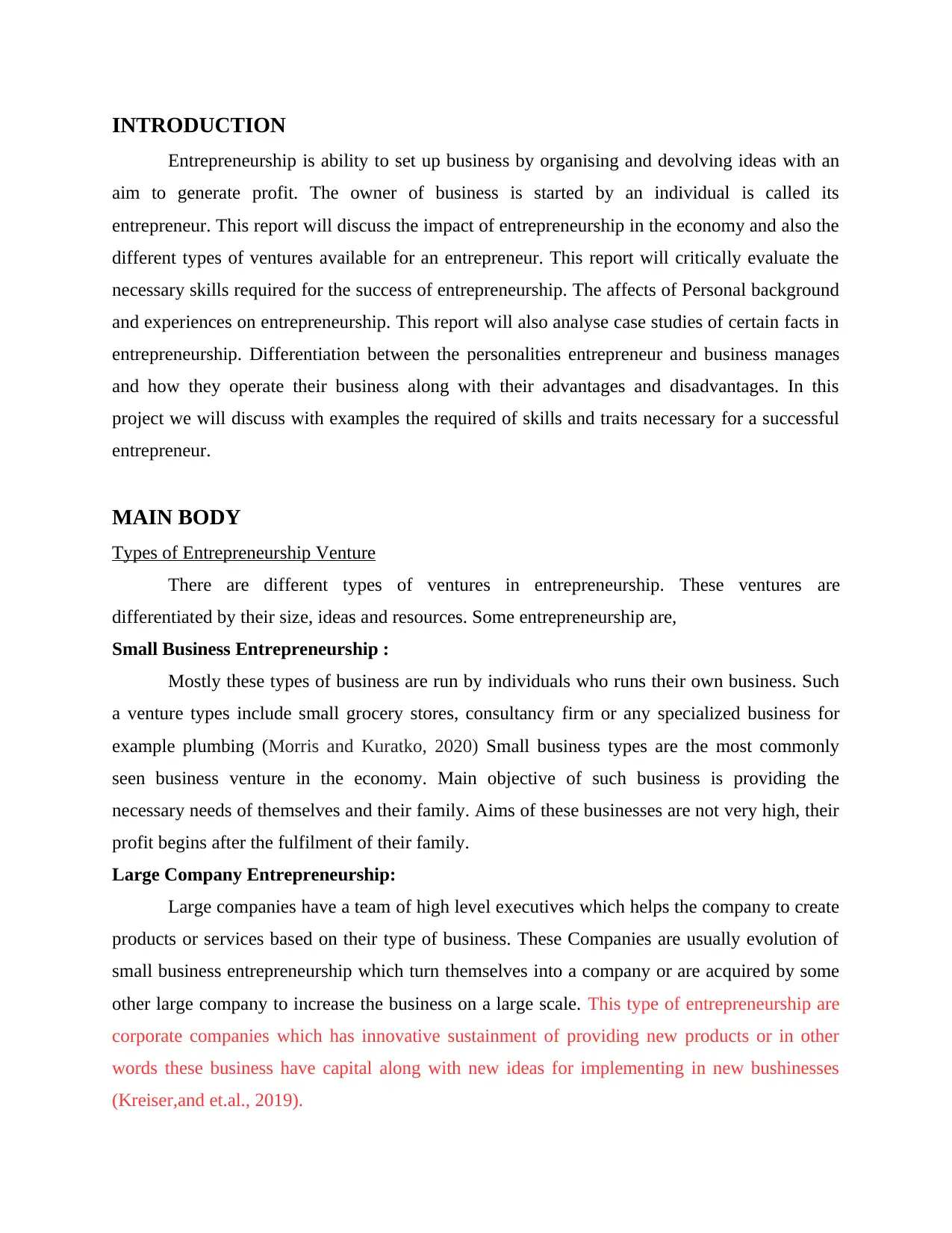
INTRODUCTION
Entrepreneurship is ability to set up business by organising and devolving ideas with an
aim to generate profit. The owner of business is started by an individual is called its
entrepreneur. This report will discuss the impact of entrepreneurship in the economy and also the
different types of ventures available for an entrepreneur. This report will critically evaluate the
necessary skills required for the success of entrepreneurship. The affects of Personal background
and experiences on entrepreneurship. This report will also analyse case studies of certain facts in
entrepreneurship. Differentiation between the personalities entrepreneur and business manages
and how they operate their business along with their advantages and disadvantages. In this
project we will discuss with examples the required of skills and traits necessary for a successful
entrepreneur.
MAIN BODY
Types of Entrepreneurship Venture
There are different types of ventures in entrepreneurship. These ventures are
differentiated by their size, ideas and resources. Some entrepreneurship are,
Small Business Entrepreneurship :
Mostly these types of business are run by individuals who runs their own business. Such
a venture types include small grocery stores, consultancy firm or any specialized business for
example plumbing (Morris and Kuratko, 2020) Small business types are the most commonly
seen business venture in the economy. Main objective of such business is providing the
necessary needs of themselves and their family. Aims of these businesses are not very high, their
profit begins after the fulfilment of their family.
Large Company Entrepreneurship:
Large companies have a team of high level executives which helps the company to create
products or services based on their type of business. These Companies are usually evolution of
small business entrepreneurship which turn themselves into a company or are acquired by some
other large company to increase the business on a large scale. This type of entrepreneurship are
corporate companies which has innovative sustainment of providing new products or in other
words these business have capital along with new ideas for implementing in new bushinesses
(Kreiser,and et.al., 2019).
Entrepreneurship is ability to set up business by organising and devolving ideas with an
aim to generate profit. The owner of business is started by an individual is called its
entrepreneur. This report will discuss the impact of entrepreneurship in the economy and also the
different types of ventures available for an entrepreneur. This report will critically evaluate the
necessary skills required for the success of entrepreneurship. The affects of Personal background
and experiences on entrepreneurship. This report will also analyse case studies of certain facts in
entrepreneurship. Differentiation between the personalities entrepreneur and business manages
and how they operate their business along with their advantages and disadvantages. In this
project we will discuss with examples the required of skills and traits necessary for a successful
entrepreneur.
MAIN BODY
Types of Entrepreneurship Venture
There are different types of ventures in entrepreneurship. These ventures are
differentiated by their size, ideas and resources. Some entrepreneurship are,
Small Business Entrepreneurship :
Mostly these types of business are run by individuals who runs their own business. Such
a venture types include small grocery stores, consultancy firm or any specialized business for
example plumbing (Morris and Kuratko, 2020) Small business types are the most commonly
seen business venture in the economy. Main objective of such business is providing the
necessary needs of themselves and their family. Aims of these businesses are not very high, their
profit begins after the fulfilment of their family.
Large Company Entrepreneurship:
Large companies have a team of high level executives which helps the company to create
products or services based on their type of business. These Companies are usually evolution of
small business entrepreneurship which turn themselves into a company or are acquired by some
other large company to increase the business on a large scale. This type of entrepreneurship are
corporate companies which has innovative sustainment of providing new products or in other
words these business have capital along with new ideas for implementing in new bushinesses
(Kreiser,and et.al., 2019).
Paraphrase This Document
Need a fresh take? Get an instant paraphrase of this document with our AI Paraphraser
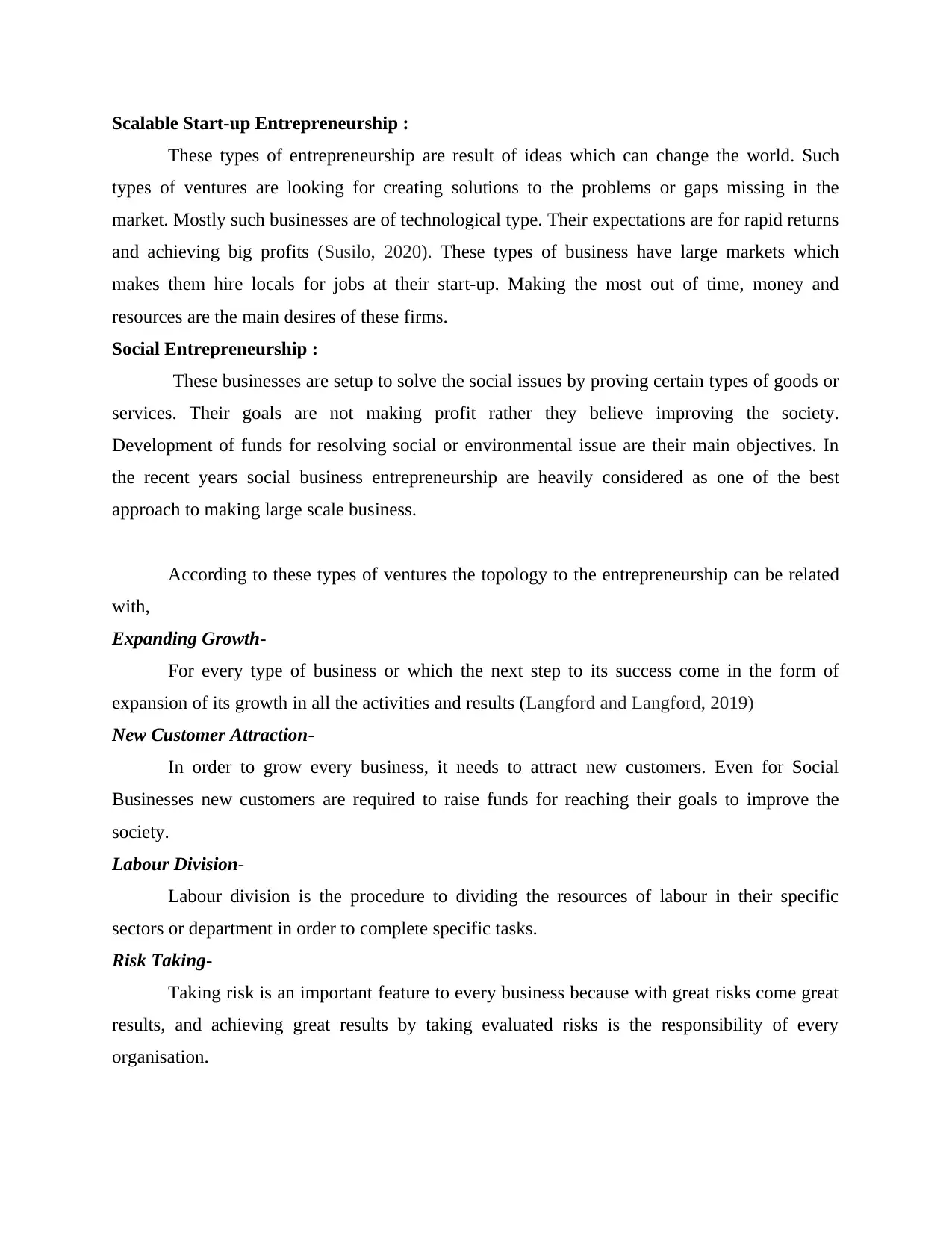
Scalable Start-up Entrepreneurship :
These types of entrepreneurship are result of ideas which can change the world. Such
types of ventures are looking for creating solutions to the problems or gaps missing in the
market. Mostly such businesses are of technological type. Their expectations are for rapid returns
and achieving big profits (Susilo, 2020). These types of business have large markets which
makes them hire locals for jobs at their start-up. Making the most out of time, money and
resources are the main desires of these firms.
Social Entrepreneurship :
These businesses are setup to solve the social issues by proving certain types of goods or
services. Their goals are not making profit rather they believe improving the society.
Development of funds for resolving social or environmental issue are their main objectives. In
the recent years social business entrepreneurship are heavily considered as one of the best
approach to making large scale business.
According to these types of ventures the topology to the entrepreneurship can be related
with,
Expanding Growth-
For every type of business or which the next step to its success come in the form of
expansion of its growth in all the activities and results (Langford and Langford, 2019)
New Customer Attraction-
In order to grow every business, it needs to attract new customers. Even for Social
Businesses new customers are required to raise funds for reaching their goals to improve the
society.
Labour Division-
Labour division is the procedure to dividing the resources of labour in their specific
sectors or department in order to complete specific tasks.
Risk Taking-
Taking risk is an important feature to every business because with great risks come great
results, and achieving great results by taking evaluated risks is the responsibility of every
organisation.
These types of entrepreneurship are result of ideas which can change the world. Such
types of ventures are looking for creating solutions to the problems or gaps missing in the
market. Mostly such businesses are of technological type. Their expectations are for rapid returns
and achieving big profits (Susilo, 2020). These types of business have large markets which
makes them hire locals for jobs at their start-up. Making the most out of time, money and
resources are the main desires of these firms.
Social Entrepreneurship :
These businesses are setup to solve the social issues by proving certain types of goods or
services. Their goals are not making profit rather they believe improving the society.
Development of funds for resolving social or environmental issue are their main objectives. In
the recent years social business entrepreneurship are heavily considered as one of the best
approach to making large scale business.
According to these types of ventures the topology to the entrepreneurship can be related
with,
Expanding Growth-
For every type of business or which the next step to its success come in the form of
expansion of its growth in all the activities and results (Langford and Langford, 2019)
New Customer Attraction-
In order to grow every business, it needs to attract new customers. Even for Social
Businesses new customers are required to raise funds for reaching their goals to improve the
society.
Labour Division-
Labour division is the procedure to dividing the resources of labour in their specific
sectors or department in order to complete specific tasks.
Risk Taking-
Taking risk is an important feature to every business because with great risks come great
results, and achieving great results by taking evaluated risks is the responsibility of every
organisation.
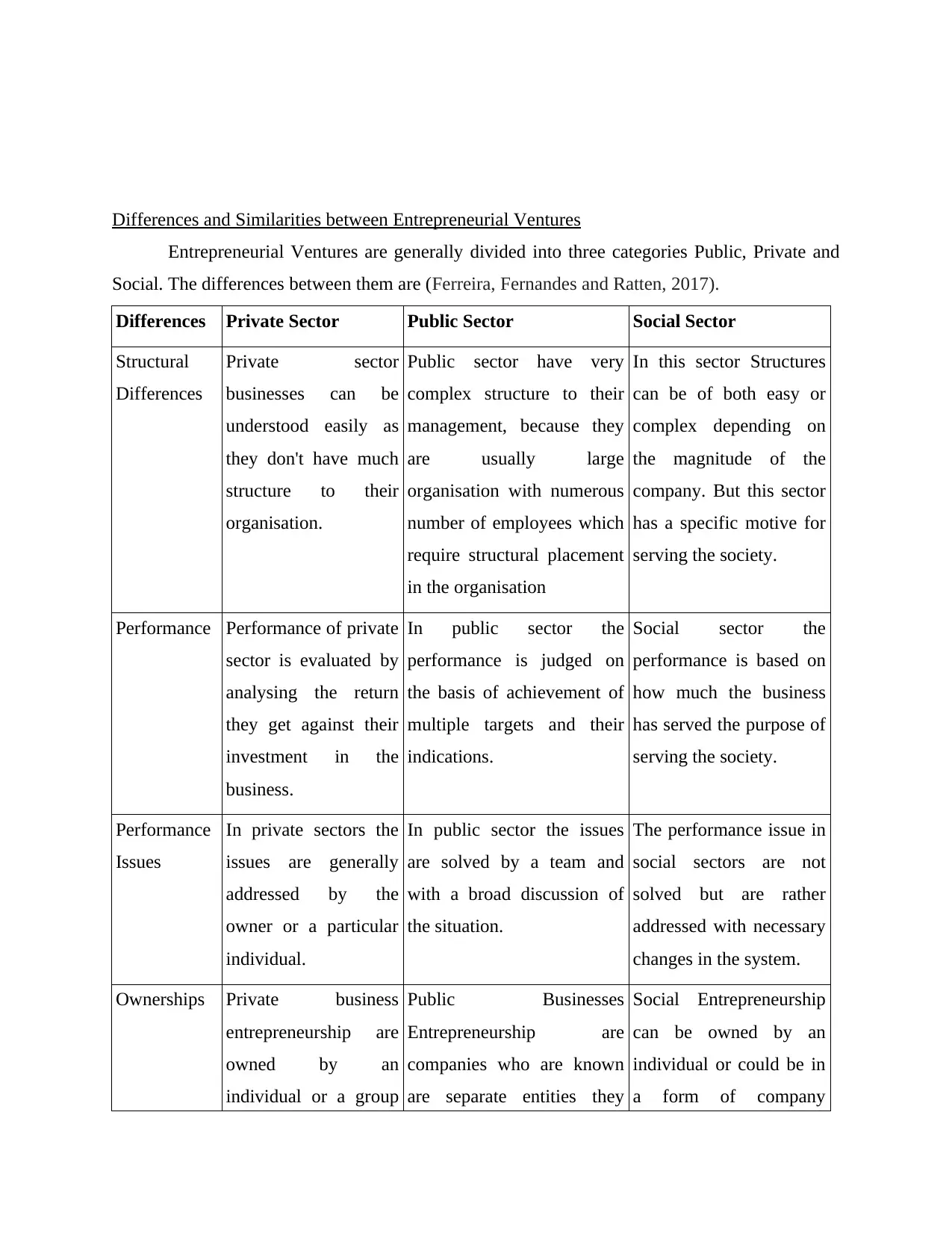
Differences and Similarities between Entrepreneurial Ventures
Entrepreneurial Ventures are generally divided into three categories Public, Private and
Social. The differences between them are (Ferreira, Fernandes and Ratten, 2017).
Differences Private Sector Public Sector Social Sector
Structural
Differences
Private sector
businesses can be
understood easily as
they don't have much
structure to their
organisation.
Public sector have very
complex structure to their
management, because they
are usually large
organisation with numerous
number of employees which
require structural placement
in the organisation
In this sector Structures
can be of both easy or
complex depending on
the magnitude of the
company. But this sector
has a specific motive for
serving the society.
Performance Performance of private
sector is evaluated by
analysing the return
they get against their
investment in the
business.
In public sector the
performance is judged on
the basis of achievement of
multiple targets and their
indications.
Social sector the
performance is based on
how much the business
has served the purpose of
serving the society.
Performance
Issues
In private sectors the
issues are generally
addressed by the
owner or a particular
individual.
In public sector the issues
are solved by a team and
with a broad discussion of
the situation.
The performance issue in
social sectors are not
solved but are rather
addressed with necessary
changes in the system.
Ownerships Private business
entrepreneurship are
owned by an
individual or a group
Public Businesses
Entrepreneurship are
companies who are known
are separate entities they
Social Entrepreneurship
can be owned by an
individual or could be in
a form of company
Entrepreneurial Ventures are generally divided into three categories Public, Private and
Social. The differences between them are (Ferreira, Fernandes and Ratten, 2017).
Differences Private Sector Public Sector Social Sector
Structural
Differences
Private sector
businesses can be
understood easily as
they don't have much
structure to their
organisation.
Public sector have very
complex structure to their
management, because they
are usually large
organisation with numerous
number of employees which
require structural placement
in the organisation
In this sector Structures
can be of both easy or
complex depending on
the magnitude of the
company. But this sector
has a specific motive for
serving the society.
Performance Performance of private
sector is evaluated by
analysing the return
they get against their
investment in the
business.
In public sector the
performance is judged on
the basis of achievement of
multiple targets and their
indications.
Social sector the
performance is based on
how much the business
has served the purpose of
serving the society.
Performance
Issues
In private sectors the
issues are generally
addressed by the
owner or a particular
individual.
In public sector the issues
are solved by a team and
with a broad discussion of
the situation.
The performance issue in
social sectors are not
solved but are rather
addressed with necessary
changes in the system.
Ownerships Private business
entrepreneurship are
owned by an
individual or a group
Public Businesses
Entrepreneurship are
companies who are known
are separate entities they
Social Entrepreneurship
can be owned by an
individual or could be in
a form of company
⊘ This is a preview!⊘
Do you want full access?
Subscribe today to unlock all pages.

Trusted by 1+ million students worldwide
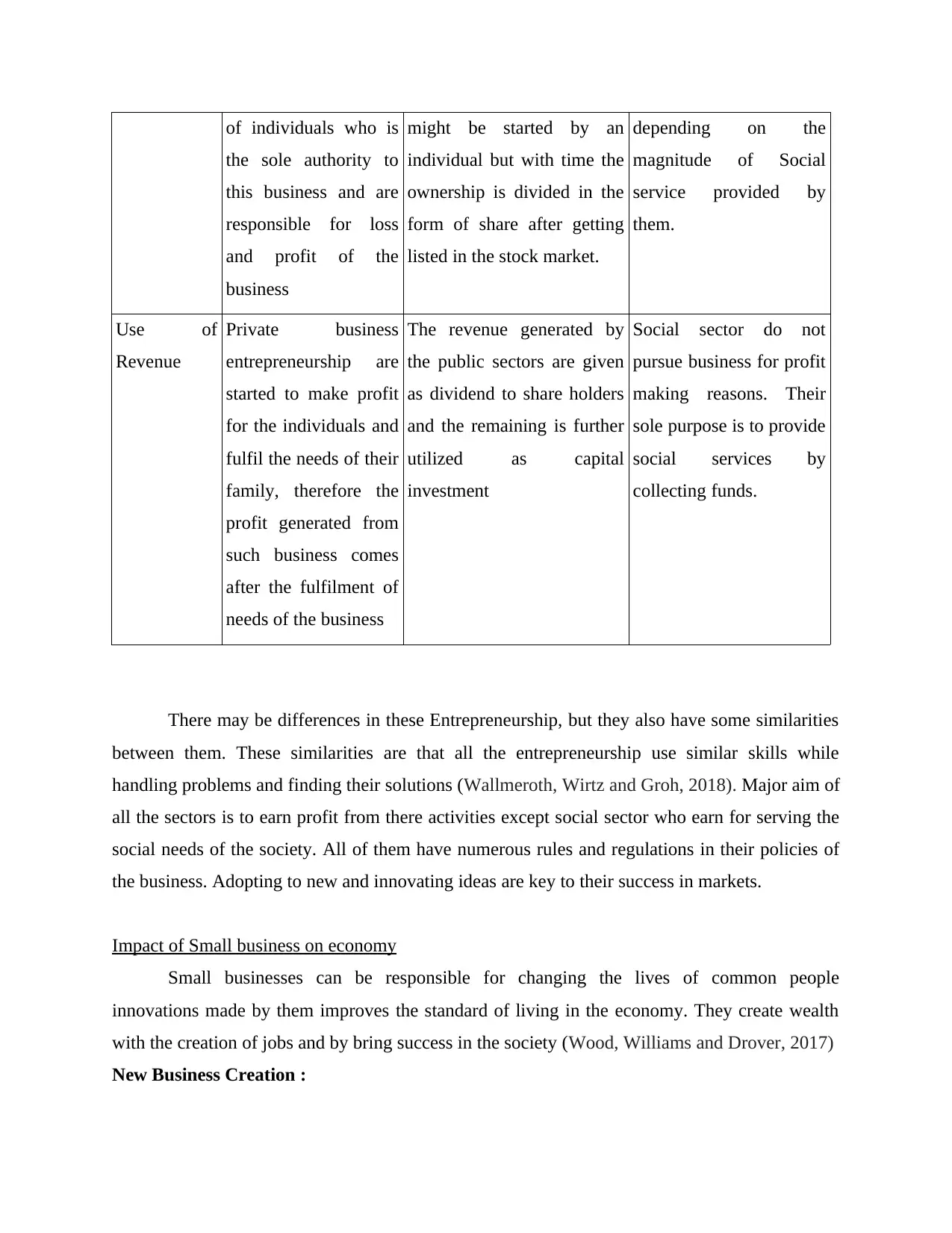
of individuals who is
the sole authority to
this business and are
responsible for loss
and profit of the
business
might be started by an
individual but with time the
ownership is divided in the
form of share after getting
listed in the stock market.
depending on the
magnitude of Social
service provided by
them.
Use of
Revenue
Private business
entrepreneurship are
started to make profit
for the individuals and
fulfil the needs of their
family, therefore the
profit generated from
such business comes
after the fulfilment of
needs of the business
The revenue generated by
the public sectors are given
as dividend to share holders
and the remaining is further
utilized as capital
investment
Social sector do not
pursue business for profit
making reasons. Their
sole purpose is to provide
social services by
collecting funds.
There may be differences in these Entrepreneurship, but they also have some similarities
between them. These similarities are that all the entrepreneurship use similar skills while
handling problems and finding their solutions (Wallmeroth, Wirtz and Groh, 2018). Major aim of
all the sectors is to earn profit from there activities except social sector who earn for serving the
social needs of the society. All of them have numerous rules and regulations in their policies of
the business. Adopting to new and innovating ideas are key to their success in markets.
Impact of Small business on economy
Small businesses can be responsible for changing the lives of common people
innovations made by them improves the standard of living in the economy. They create wealth
with the creation of jobs and by bring success in the society (Wood, Williams and Drover, 2017)
New Business Creation :
the sole authority to
this business and are
responsible for loss
and profit of the
business
might be started by an
individual but with time the
ownership is divided in the
form of share after getting
listed in the stock market.
depending on the
magnitude of Social
service provided by
them.
Use of
Revenue
Private business
entrepreneurship are
started to make profit
for the individuals and
fulfil the needs of their
family, therefore the
profit generated from
such business comes
after the fulfilment of
needs of the business
The revenue generated by
the public sectors are given
as dividend to share holders
and the remaining is further
utilized as capital
investment
Social sector do not
pursue business for profit
making reasons. Their
sole purpose is to provide
social services by
collecting funds.
There may be differences in these Entrepreneurship, but they also have some similarities
between them. These similarities are that all the entrepreneurship use similar skills while
handling problems and finding their solutions (Wallmeroth, Wirtz and Groh, 2018). Major aim of
all the sectors is to earn profit from there activities except social sector who earn for serving the
social needs of the society. All of them have numerous rules and regulations in their policies of
the business. Adopting to new and innovating ideas are key to their success in markets.
Impact of Small business on economy
Small businesses can be responsible for changing the lives of common people
innovations made by them improves the standard of living in the economy. They create wealth
with the creation of jobs and by bring success in the society (Wood, Williams and Drover, 2017)
New Business Creation :
Paraphrase This Document
Need a fresh take? Get an instant paraphrase of this document with our AI Paraphraser
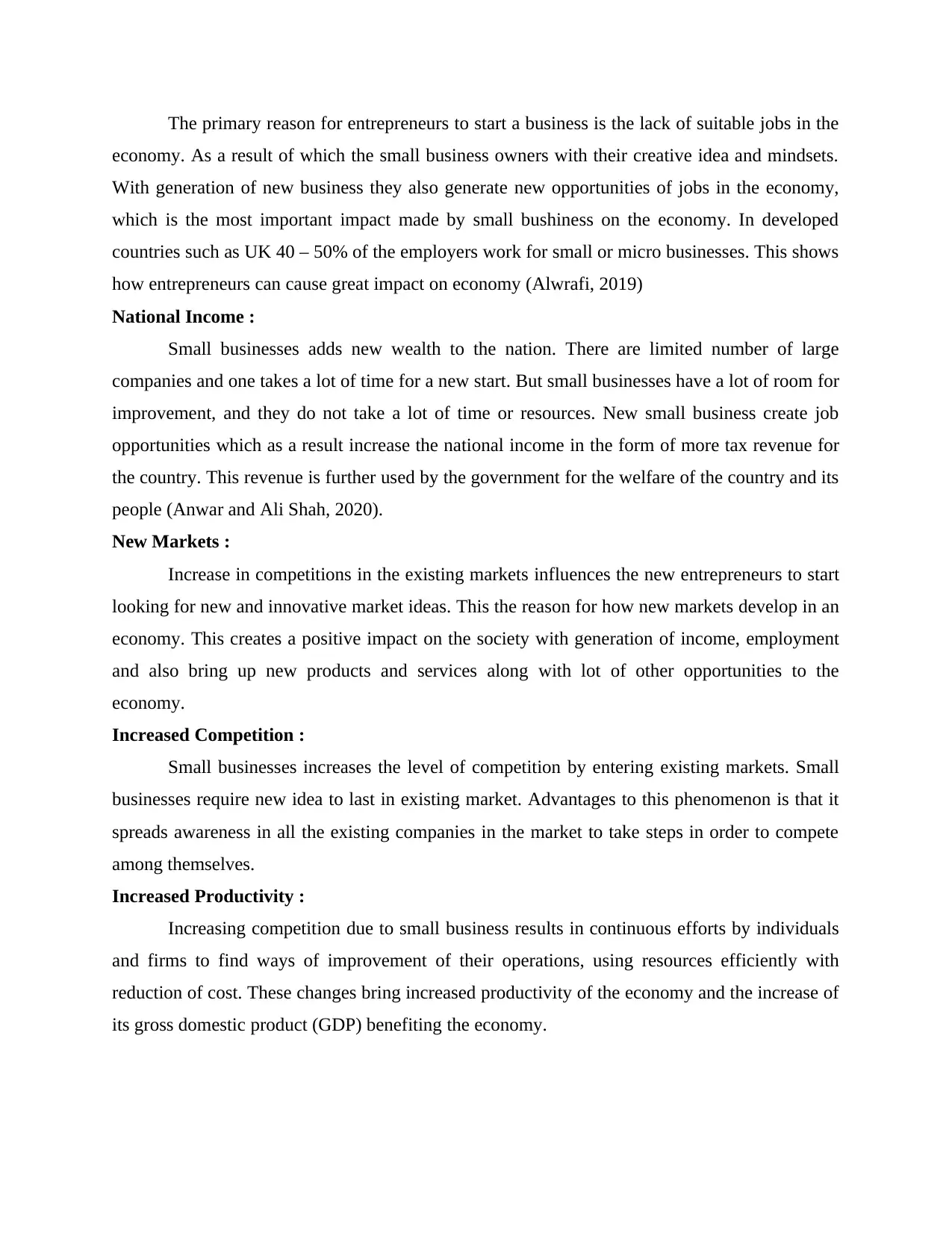
The primary reason for entrepreneurs to start a business is the lack of suitable jobs in the
economy. As a result of which the small business owners with their creative idea and mindsets.
With generation of new business they also generate new opportunities of jobs in the economy,
which is the most important impact made by small bushiness on the economy. In developed
countries such as UK 40 – 50% of the employers work for small or micro businesses. This shows
how entrepreneurs can cause great impact on economy (Alwrafi, 2019)
National Income :
Small businesses adds new wealth to the nation. There are limited number of large
companies and one takes a lot of time for a new start. But small businesses have a lot of room for
improvement, and they do not take a lot of time or resources. New small business create job
opportunities which as a result increase the national income in the form of more tax revenue for
the country. This revenue is further used by the government for the welfare of the country and its
people (Anwar and Ali Shah, 2020).
New Markets :
Increase in competitions in the existing markets influences the new entrepreneurs to start
looking for new and innovative market ideas. This the reason for how new markets develop in an
economy. This creates a positive impact on the society with generation of income, employment
and also bring up new products and services along with lot of other opportunities to the
economy.
Increased Competition :
Small businesses increases the level of competition by entering existing markets. Small
businesses require new idea to last in existing market. Advantages to this phenomenon is that it
spreads awareness in all the existing companies in the market to take steps in order to compete
among themselves.
Increased Productivity :
Increasing competition due to small business results in continuous efforts by individuals
and firms to find ways of improvement of their operations, using resources efficiently with
reduction of cost. These changes bring increased productivity of the economy and the increase of
its gross domestic product (GDP) benefiting the economy.
economy. As a result of which the small business owners with their creative idea and mindsets.
With generation of new business they also generate new opportunities of jobs in the economy,
which is the most important impact made by small bushiness on the economy. In developed
countries such as UK 40 – 50% of the employers work for small or micro businesses. This shows
how entrepreneurs can cause great impact on economy (Alwrafi, 2019)
National Income :
Small businesses adds new wealth to the nation. There are limited number of large
companies and one takes a lot of time for a new start. But small businesses have a lot of room for
improvement, and they do not take a lot of time or resources. New small business create job
opportunities which as a result increase the national income in the form of more tax revenue for
the country. This revenue is further used by the government for the welfare of the country and its
people (Anwar and Ali Shah, 2020).
New Markets :
Increase in competitions in the existing markets influences the new entrepreneurs to start
looking for new and innovative market ideas. This the reason for how new markets develop in an
economy. This creates a positive impact on the society with generation of income, employment
and also bring up new products and services along with lot of other opportunities to the
economy.
Increased Competition :
Small businesses increases the level of competition by entering existing markets. Small
businesses require new idea to last in existing market. Advantages to this phenomenon is that it
spreads awareness in all the existing companies in the market to take steps in order to compete
among themselves.
Increased Productivity :
Increasing competition due to small business results in continuous efforts by individuals
and firms to find ways of improvement of their operations, using resources efficiently with
reduction of cost. These changes bring increased productivity of the economy and the increase of
its gross domestic product (GDP) benefiting the economy.
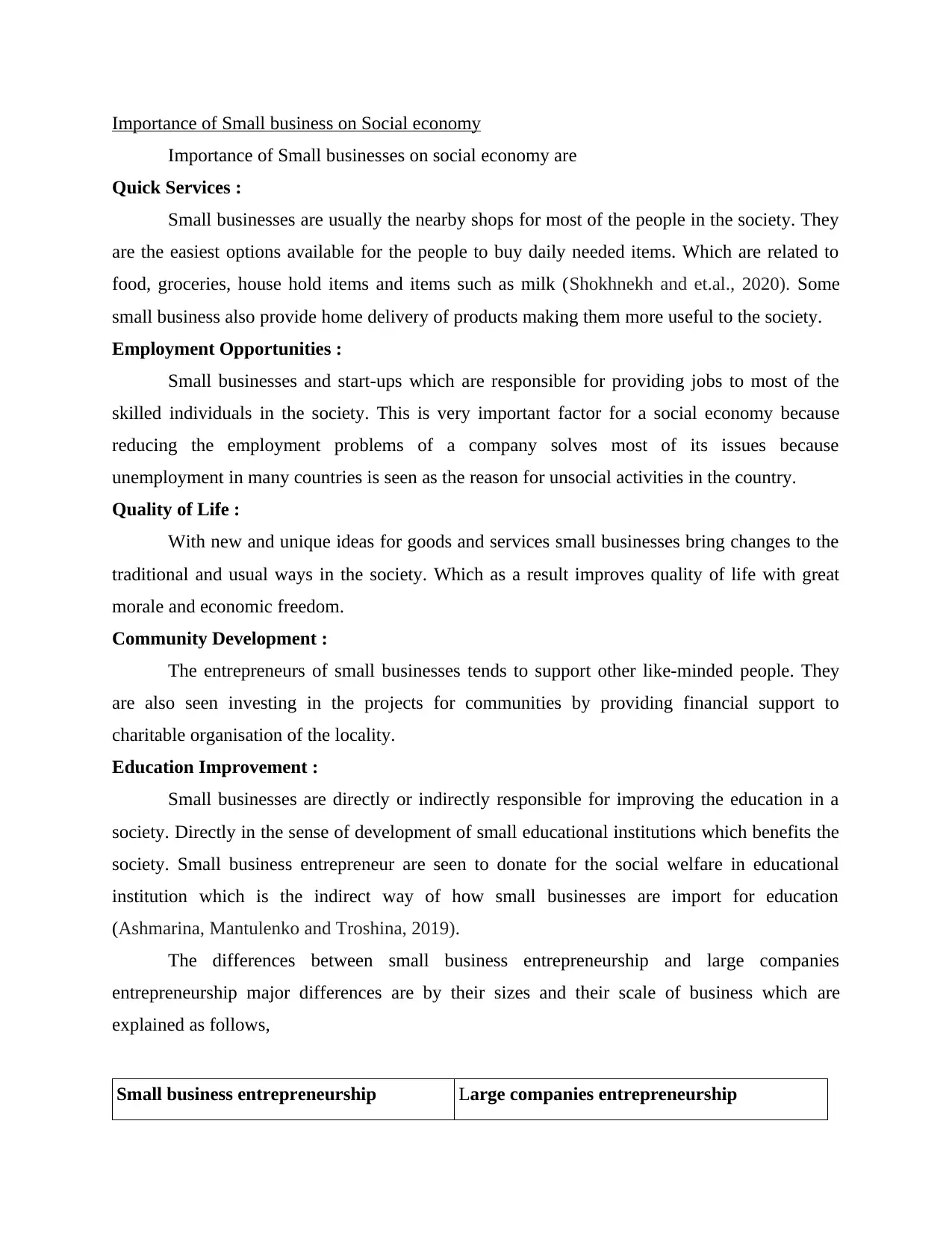
Importance of Small business on Social economy
Importance of Small businesses on social economy are
Quick Services :
Small businesses are usually the nearby shops for most of the people in the society. They
are the easiest options available for the people to buy daily needed items. Which are related to
food, groceries, house hold items and items such as milk (Shokhnekh and et.al., 2020). Some
small business also provide home delivery of products making them more useful to the society.
Employment Opportunities :
Small businesses and start-ups which are responsible for providing jobs to most of the
skilled individuals in the society. This is very important factor for a social economy because
reducing the employment problems of a company solves most of its issues because
unemployment in many countries is seen as the reason for unsocial activities in the country.
Quality of Life :
With new and unique ideas for goods and services small businesses bring changes to the
traditional and usual ways in the society. Which as a result improves quality of life with great
morale and economic freedom.
Community Development :
The entrepreneurs of small businesses tends to support other like-minded people. They
are also seen investing in the projects for communities by providing financial support to
charitable organisation of the locality.
Education Improvement :
Small businesses are directly or indirectly responsible for improving the education in a
society. Directly in the sense of development of small educational institutions which benefits the
society. Small business entrepreneur are seen to donate for the social welfare in educational
institution which is the indirect way of how small businesses are import for education
(Ashmarina, Mantulenko and Troshina, 2019).
The differences between small business entrepreneurship and large companies
entrepreneurship major differences are by their sizes and their scale of business which are
explained as follows,
Small business entrepreneurship Large companies entrepreneurship
Importance of Small businesses on social economy are
Quick Services :
Small businesses are usually the nearby shops for most of the people in the society. They
are the easiest options available for the people to buy daily needed items. Which are related to
food, groceries, house hold items and items such as milk (Shokhnekh and et.al., 2020). Some
small business also provide home delivery of products making them more useful to the society.
Employment Opportunities :
Small businesses and start-ups which are responsible for providing jobs to most of the
skilled individuals in the society. This is very important factor for a social economy because
reducing the employment problems of a company solves most of its issues because
unemployment in many countries is seen as the reason for unsocial activities in the country.
Quality of Life :
With new and unique ideas for goods and services small businesses bring changes to the
traditional and usual ways in the society. Which as a result improves quality of life with great
morale and economic freedom.
Community Development :
The entrepreneurs of small businesses tends to support other like-minded people. They
are also seen investing in the projects for communities by providing financial support to
charitable organisation of the locality.
Education Improvement :
Small businesses are directly or indirectly responsible for improving the education in a
society. Directly in the sense of development of small educational institutions which benefits the
society. Small business entrepreneur are seen to donate for the social welfare in educational
institution which is the indirect way of how small businesses are import for education
(Ashmarina, Mantulenko and Troshina, 2019).
The differences between small business entrepreneurship and large companies
entrepreneurship major differences are by their sizes and their scale of business which are
explained as follows,
Small business entrepreneurship Large companies entrepreneurship
⊘ This is a preview!⊘
Do you want full access?
Subscribe today to unlock all pages.

Trusted by 1+ million students worldwide
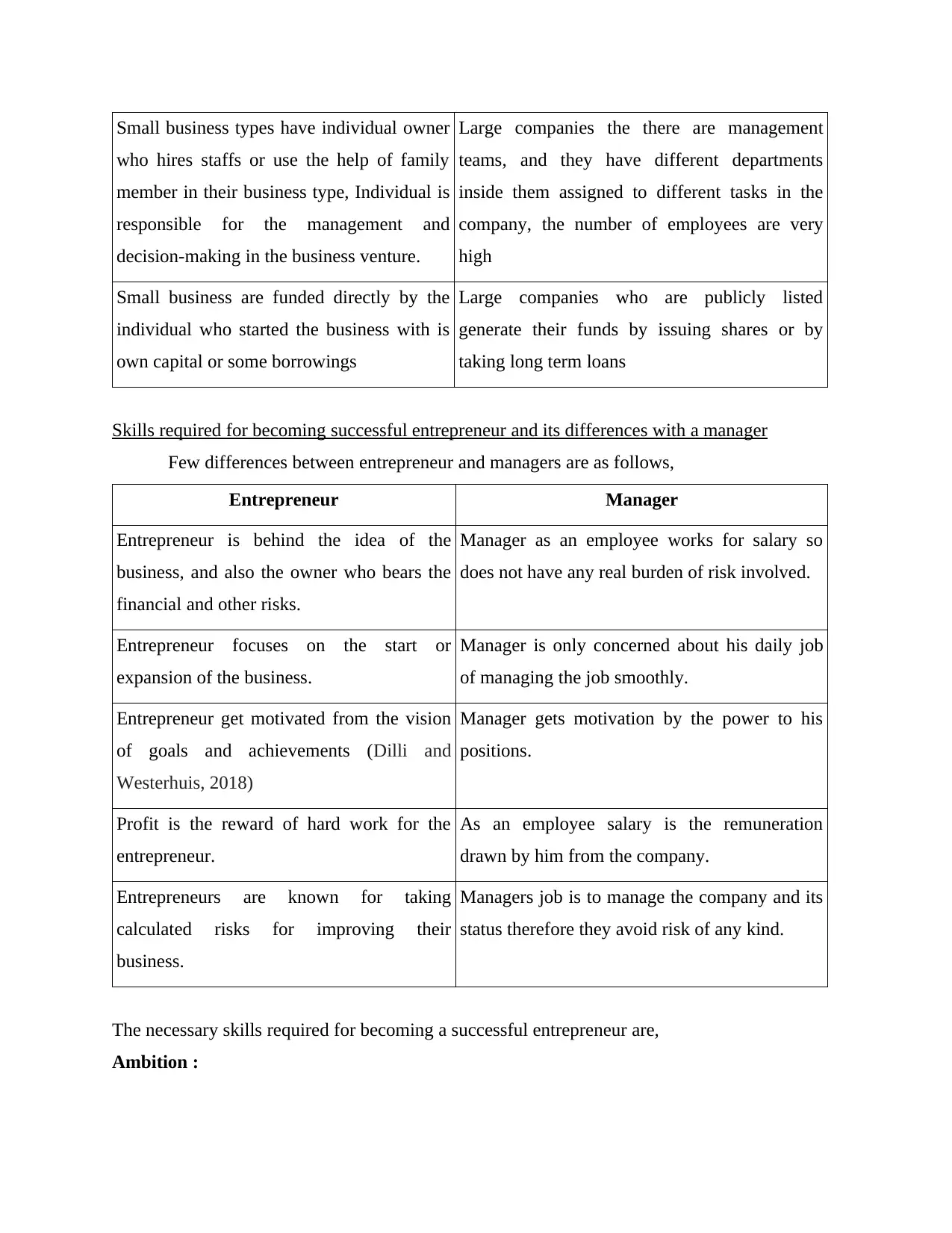
Small business types have individual owner
who hires staffs or use the help of family
member in their business type, Individual is
responsible for the management and
decision-making in the business venture.
Large companies the there are management
teams, and they have different departments
inside them assigned to different tasks in the
company, the number of employees are very
high
Small business are funded directly by the
individual who started the business with is
own capital or some borrowings
Large companies who are publicly listed
generate their funds by issuing shares or by
taking long term loans
Skills required for becoming successful entrepreneur and its differences with a manager
Few differences between entrepreneur and managers are as follows,
Entrepreneur Manager
Entrepreneur is behind the idea of the
business, and also the owner who bears the
financial and other risks.
Manager as an employee works for salary so
does not have any real burden of risk involved.
Entrepreneur focuses on the start or
expansion of the business.
Manager is only concerned about his daily job
of managing the job smoothly.
Entrepreneur get motivated from the vision
of goals and achievements (Dilli and
Westerhuis, 2018)
Manager gets motivation by the power to his
positions.
Profit is the reward of hard work for the
entrepreneur.
As an employee salary is the remuneration
drawn by him from the company.
Entrepreneurs are known for taking
calculated risks for improving their
business.
Managers job is to manage the company and its
status therefore they avoid risk of any kind.
The necessary skills required for becoming a successful entrepreneur are,
Ambition :
who hires staffs or use the help of family
member in their business type, Individual is
responsible for the management and
decision-making in the business venture.
Large companies the there are management
teams, and they have different departments
inside them assigned to different tasks in the
company, the number of employees are very
high
Small business are funded directly by the
individual who started the business with is
own capital or some borrowings
Large companies who are publicly listed
generate their funds by issuing shares or by
taking long term loans
Skills required for becoming successful entrepreneur and its differences with a manager
Few differences between entrepreneur and managers are as follows,
Entrepreneur Manager
Entrepreneur is behind the idea of the
business, and also the owner who bears the
financial and other risks.
Manager as an employee works for salary so
does not have any real burden of risk involved.
Entrepreneur focuses on the start or
expansion of the business.
Manager is only concerned about his daily job
of managing the job smoothly.
Entrepreneur get motivated from the vision
of goals and achievements (Dilli and
Westerhuis, 2018)
Manager gets motivation by the power to his
positions.
Profit is the reward of hard work for the
entrepreneur.
As an employee salary is the remuneration
drawn by him from the company.
Entrepreneurs are known for taking
calculated risks for improving their
business.
Managers job is to manage the company and its
status therefore they avoid risk of any kind.
The necessary skills required for becoming a successful entrepreneur are,
Ambition :
Paraphrase This Document
Need a fresh take? Get an instant paraphrase of this document with our AI Paraphraser
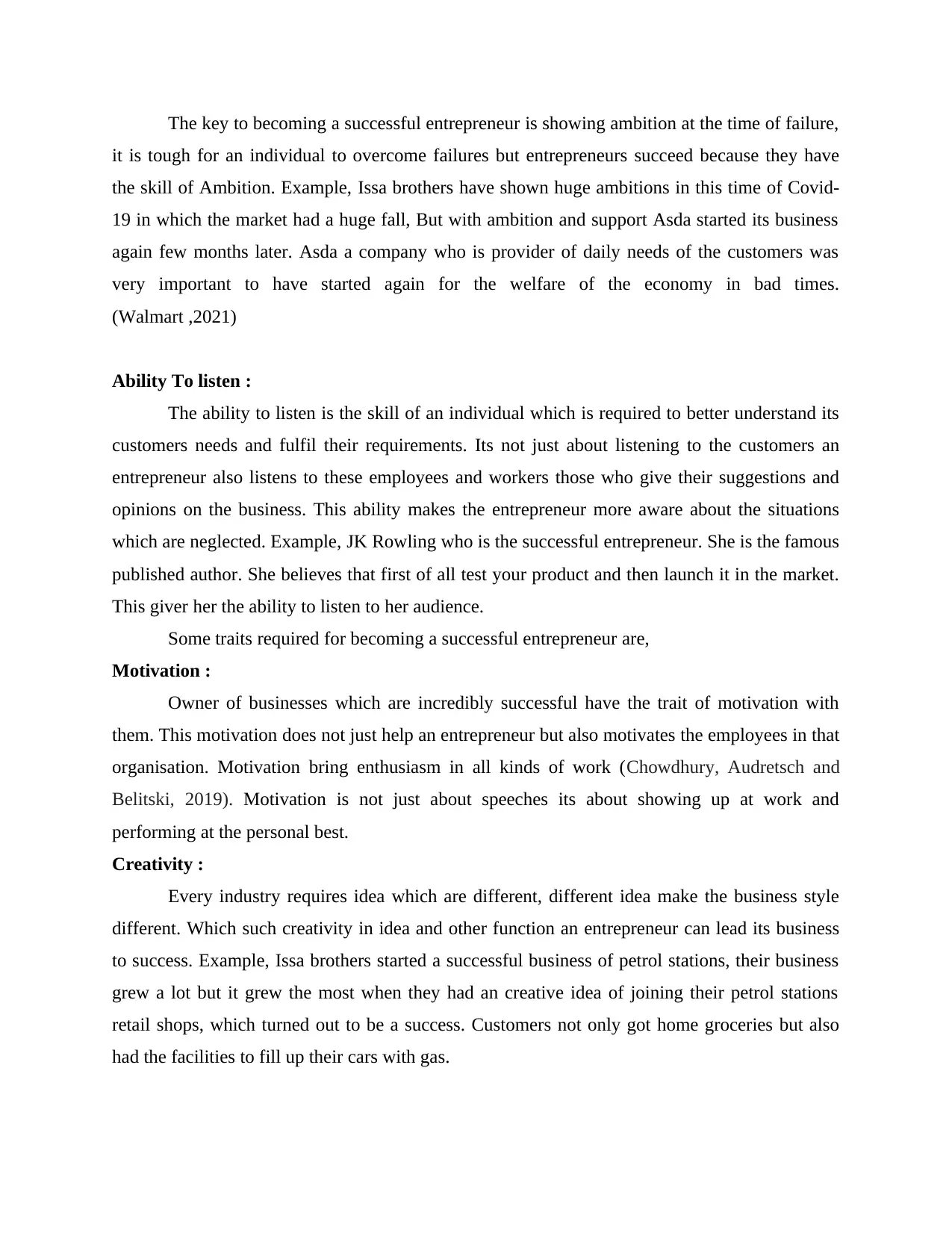
The key to becoming a successful entrepreneur is showing ambition at the time of failure,
it is tough for an individual to overcome failures but entrepreneurs succeed because they have
the skill of Ambition. Example, Issa brothers have shown huge ambitions in this time of Covid-
19 in which the market had a huge fall, But with ambition and support Asda started its business
again few months later. Asda a company who is provider of daily needs of the customers was
very important to have started again for the welfare of the economy in bad times.
(Walmart ,2021)
Ability To listen :
The ability to listen is the skill of an individual which is required to better understand its
customers needs and fulfil their requirements. Its not just about listening to the customers an
entrepreneur also listens to these employees and workers those who give their suggestions and
opinions on the business. This ability makes the entrepreneur more aware about the situations
which are neglected. Example, JK Rowling who is the successful entrepreneur. She is the famous
published author. She believes that first of all test your product and then launch it in the market.
This giver her the ability to listen to her audience.
Some traits required for becoming a successful entrepreneur are,
Motivation :
Owner of businesses which are incredibly successful have the trait of motivation with
them. This motivation does not just help an entrepreneur but also motivates the employees in that
organisation. Motivation bring enthusiasm in all kinds of work (Chowdhury, Audretsch and
Belitski, 2019). Motivation is not just about speeches its about showing up at work and
performing at the personal best.
Creativity :
Every industry requires idea which are different, different idea make the business style
different. Which such creativity in idea and other function an entrepreneur can lead its business
to success. Example, Issa brothers started a successful business of petrol stations, their business
grew a lot but it grew the most when they had an creative idea of joining their petrol stations
retail shops, which turned out to be a success. Customers not only got home groceries but also
had the facilities to fill up their cars with gas.
it is tough for an individual to overcome failures but entrepreneurs succeed because they have
the skill of Ambition. Example, Issa brothers have shown huge ambitions in this time of Covid-
19 in which the market had a huge fall, But with ambition and support Asda started its business
again few months later. Asda a company who is provider of daily needs of the customers was
very important to have started again for the welfare of the economy in bad times.
(Walmart ,2021)
Ability To listen :
The ability to listen is the skill of an individual which is required to better understand its
customers needs and fulfil their requirements. Its not just about listening to the customers an
entrepreneur also listens to these employees and workers those who give their suggestions and
opinions on the business. This ability makes the entrepreneur more aware about the situations
which are neglected. Example, JK Rowling who is the successful entrepreneur. She is the famous
published author. She believes that first of all test your product and then launch it in the market.
This giver her the ability to listen to her audience.
Some traits required for becoming a successful entrepreneur are,
Motivation :
Owner of businesses which are incredibly successful have the trait of motivation with
them. This motivation does not just help an entrepreneur but also motivates the employees in that
organisation. Motivation bring enthusiasm in all kinds of work (Chowdhury, Audretsch and
Belitski, 2019). Motivation is not just about speeches its about showing up at work and
performing at the personal best.
Creativity :
Every industry requires idea which are different, different idea make the business style
different. Which such creativity in idea and other function an entrepreneur can lead its business
to success. Example, Issa brothers started a successful business of petrol stations, their business
grew a lot but it grew the most when they had an creative idea of joining their petrol stations
retail shops, which turned out to be a success. Customers not only got home groceries but also
had the facilities to fill up their cars with gas.
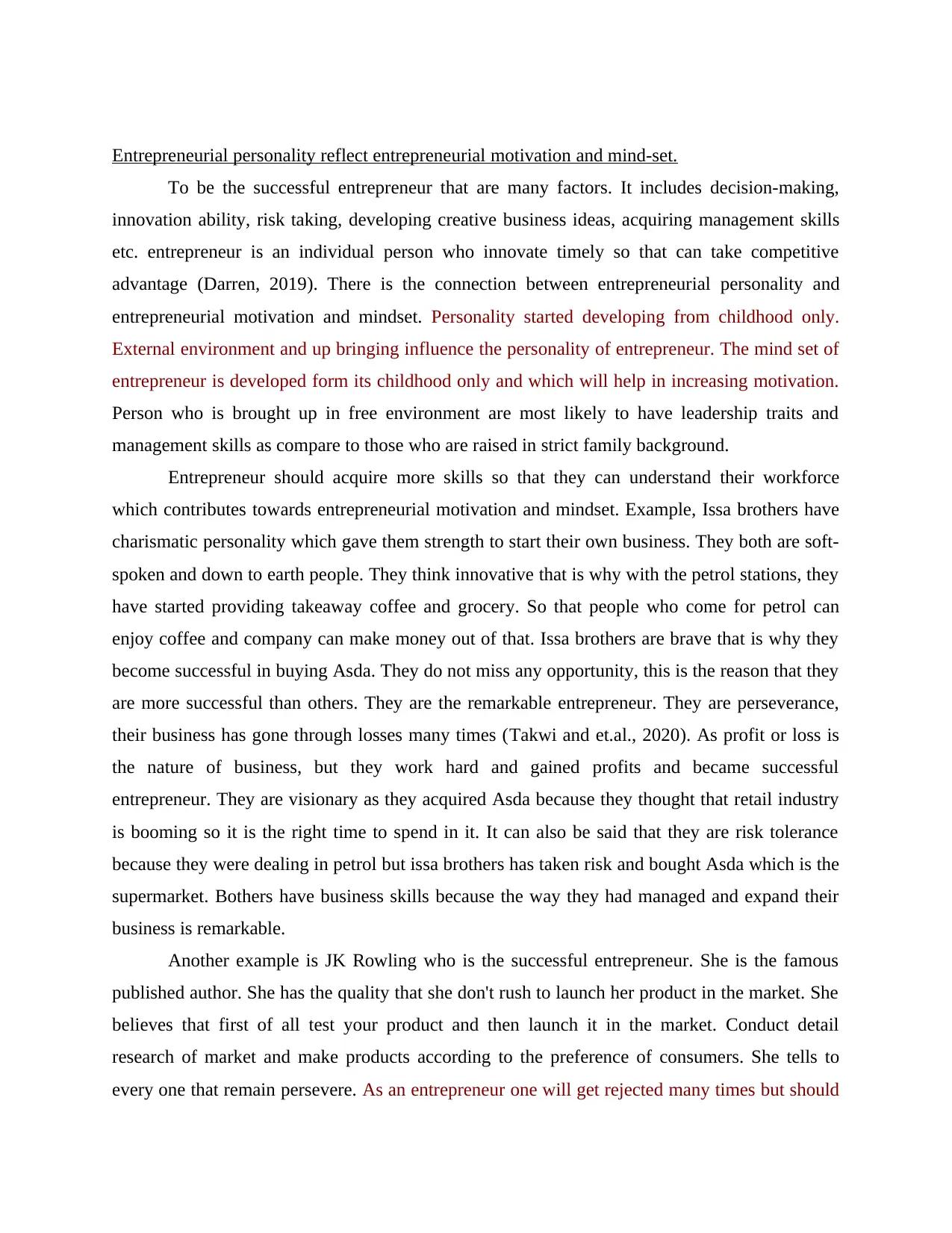
Entrepreneurial personality reflect entrepreneurial motivation and mind-set.
To be the successful entrepreneur that are many factors. It includes decision-making,
innovation ability, risk taking, developing creative business ideas, acquiring management skills
etc. entrepreneur is an individual person who innovate timely so that can take competitive
advantage (Darren, 2019). There is the connection between entrepreneurial personality and
entrepreneurial motivation and mindset. Personality started developing from childhood only.
External environment and up bringing influence the personality of entrepreneur. The mind set of
entrepreneur is developed form its childhood only and which will help in increasing motivation.
Person who is brought up in free environment are most likely to have leadership traits and
management skills as compare to those who are raised in strict family background.
Entrepreneur should acquire more skills so that they can understand their workforce
which contributes towards entrepreneurial motivation and mindset. Example, Issa brothers have
charismatic personality which gave them strength to start their own business. They both are soft-
spoken and down to earth people. They think innovative that is why with the petrol stations, they
have started providing takeaway coffee and grocery. So that people who come for petrol can
enjoy coffee and company can make money out of that. Issa brothers are brave that is why they
become successful in buying Asda. They do not miss any opportunity, this is the reason that they
are more successful than others. They are the remarkable entrepreneur. They are perseverance,
their business has gone through losses many times (Takwi and et.al., 2020). As profit or loss is
the nature of business, but they work hard and gained profits and became successful
entrepreneur. They are visionary as they acquired Asda because they thought that retail industry
is booming so it is the right time to spend in it. It can also be said that they are risk tolerance
because they were dealing in petrol but issa brothers has taken risk and bought Asda which is the
supermarket. Bothers have business skills because the way they had managed and expand their
business is remarkable.
Another example is JK Rowling who is the successful entrepreneur. She is the famous
published author. She has the quality that she don't rush to launch her product in the market. She
believes that first of all test your product and then launch it in the market. Conduct detail
research of market and make products according to the preference of consumers. She tells to
every one that remain persevere. As an entrepreneur one will get rejected many times but should
To be the successful entrepreneur that are many factors. It includes decision-making,
innovation ability, risk taking, developing creative business ideas, acquiring management skills
etc. entrepreneur is an individual person who innovate timely so that can take competitive
advantage (Darren, 2019). There is the connection between entrepreneurial personality and
entrepreneurial motivation and mindset. Personality started developing from childhood only.
External environment and up bringing influence the personality of entrepreneur. The mind set of
entrepreneur is developed form its childhood only and which will help in increasing motivation.
Person who is brought up in free environment are most likely to have leadership traits and
management skills as compare to those who are raised in strict family background.
Entrepreneur should acquire more skills so that they can understand their workforce
which contributes towards entrepreneurial motivation and mindset. Example, Issa brothers have
charismatic personality which gave them strength to start their own business. They both are soft-
spoken and down to earth people. They think innovative that is why with the petrol stations, they
have started providing takeaway coffee and grocery. So that people who come for petrol can
enjoy coffee and company can make money out of that. Issa brothers are brave that is why they
become successful in buying Asda. They do not miss any opportunity, this is the reason that they
are more successful than others. They are the remarkable entrepreneur. They are perseverance,
their business has gone through losses many times (Takwi and et.al., 2020). As profit or loss is
the nature of business, but they work hard and gained profits and became successful
entrepreneur. They are visionary as they acquired Asda because they thought that retail industry
is booming so it is the right time to spend in it. It can also be said that they are risk tolerance
because they were dealing in petrol but issa brothers has taken risk and bought Asda which is the
supermarket. Bothers have business skills because the way they had managed and expand their
business is remarkable.
Another example is JK Rowling who is the successful entrepreneur. She is the famous
published author. She has the quality that she don't rush to launch her product in the market. She
believes that first of all test your product and then launch it in the market. Conduct detail
research of market and make products according to the preference of consumers. She tells to
every one that remain persevere. As an entrepreneur one will get rejected many times but should
⊘ This is a preview!⊘
Do you want full access?
Subscribe today to unlock all pages.

Trusted by 1+ million students worldwide
1 out of 17
Related Documents
Your All-in-One AI-Powered Toolkit for Academic Success.
+13062052269
info@desklib.com
Available 24*7 on WhatsApp / Email
![[object Object]](/_next/static/media/star-bottom.7253800d.svg)
Unlock your academic potential
Copyright © 2020–2025 A2Z Services. All Rights Reserved. Developed and managed by ZUCOL.





